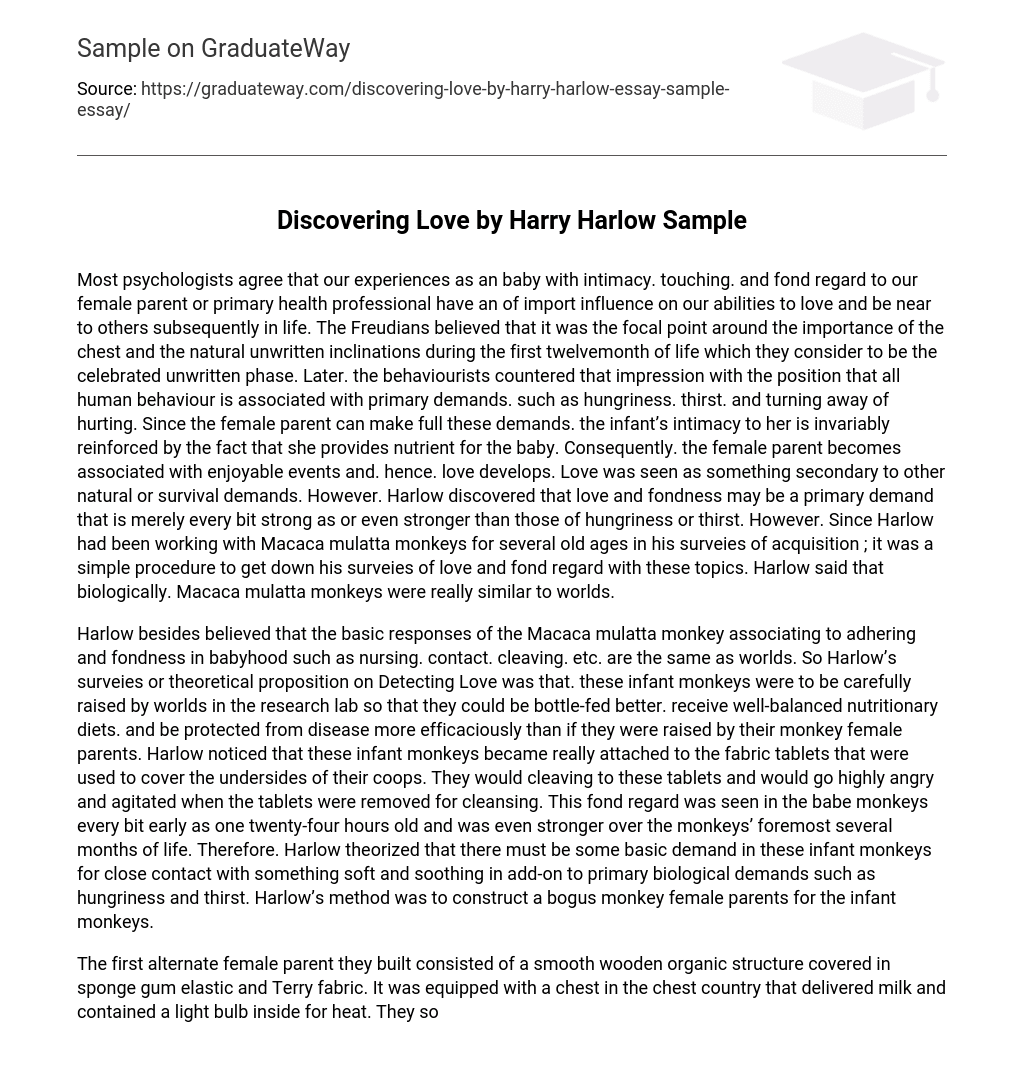Most psychologists agree that our experiences as an baby with intimacy. touching. and fond regard to our female parent or primary health professional have an of import influence on our abilities to love and be near to others subsequently in life. The Freudians believed that it was the focal point around the importance of the chest and the natural unwritten inclinations during the first twelvemonth of life which they consider to be the celebrated unwritten phase. Later. the behaviourists countered that impression with the position that all human behaviour is associated with primary demands. such as hungriness. thirst. and turning away of hurting. Since the female parent can make full these demands. the infant’s intimacy to her is invariably reinforced by the fact that she provides nutrient for the baby. Consequently. the female parent becomes associated with enjoyable events and. hence. love develops. Love was seen as something secondary to other natural or survival demands. However. Harlow discovered that love and fondness may be a primary demand that is merely every bit strong as or even stronger than those of hungriness or thirst. However. Since Harlow had been working with Macaca mulatta monkeys for several old ages in his surveies of acquisition ; it was a simple procedure to get down his surveies of love and fond regard with these topics. Harlow said that biologically. Macaca mulatta monkeys were really similar to worlds.
Harlow besides believed that the basic responses of the Macaca mulatta monkey associating to adhering and fondness in babyhood such as nursing. contact. cleaving. etc. are the same as worlds. So Harlow’s surveies or theoretical proposition on Detecting Love was that. these infant monkeys were to be carefully raised by worlds in the research lab so that they could be bottle-fed better. receive well-balanced nutritionary diets. and be protected from disease more efficaciously than if they were raised by their monkey female parents. Harlow noticed that these infant monkeys became really attached to the fabric tablets that were used to cover the undersides of their coops. They would cleaving to these tablets and would go highly angry and agitated when the tablets were removed for cleansing. This fond regard was seen in the babe monkeys every bit early as one twenty-four hours old and was even stronger over the monkeys’ foremost several months of life. Therefore. Harlow theorized that there must be some basic demand in these infant monkeys for close contact with something soft and soothing in add-on to primary biological demands such as hungriness and thirst. Harlow’s method was to construct a bogus monkey female parents for the infant monkeys.
The first alternate female parent they built consisted of a smooth wooden organic structure covered in sponge gum elastic and Terry fabric. It was equipped with a chest in the chest country that delivered milk and contained a light bulb inside for heat. They so constructed a different sort of alternate female parent that was less able to supply soft comfort. This female parent was made of wire mesh shaped about the same as the wooden frame. so that an baby monkey could cleave to it the same manner as to the fabric female parent. This wire female parent besides came equipped with a working nursing chest and besides was able to supply heat. The wire female parent was indistinguishable to the fabric female parent in every manner except for the ability to offer what Harlow called contact comfort. These manufactured female parents were so placed in separate cells that were attached to the baby monkeys’ life coop. Eight infant monkeys were indiscriminately assigned to two groups. For one group. the fabric female parent was equipped with the feeder to supply milk. and for the other group. the wire female parent was the milk supplier.
Each monkey had a bend with the fabric female parent and the wire female parent. The consequences were that all the monkeys. regardless of which female parent had the milk. were passing about all their clip each twenty-four hours on the fabric female parent. Even those monkeys who were fed by the wire female parent would merely go forth the comfort of the fabric female parent to nurse briefly and so return to the fabric female parent instantly. The two groups of monkeys that were raised with merely a fabric or wire female parent farther demonstrated the importance of contact comfort. While both groups of these babies ate the same sum and gained weight at the same rate. the babies in the wire female parent status did non digest the milk every bit good and experienced diarrhoea.
This suggests that the deficiency of the fabric female parent was psychologically nerve-racking to the babies. In the terminal Harlow points out. the surveies reported in this article show the overpowering importance of contact comfort in the development of fond regard between infant monkeys and their female parents. The factor is that adhering appears to be well more of import than the mother’s ability to supply milk to the baby. One of the many grounds this research changed psychological science is that the findings went against the beliefs of the behaviourists at that clip. which focused on the support qualities of eating as the drive force behind the infant-mother bond. To some people Harlow finds changed the manner people view the connexion between baby and female parent.





